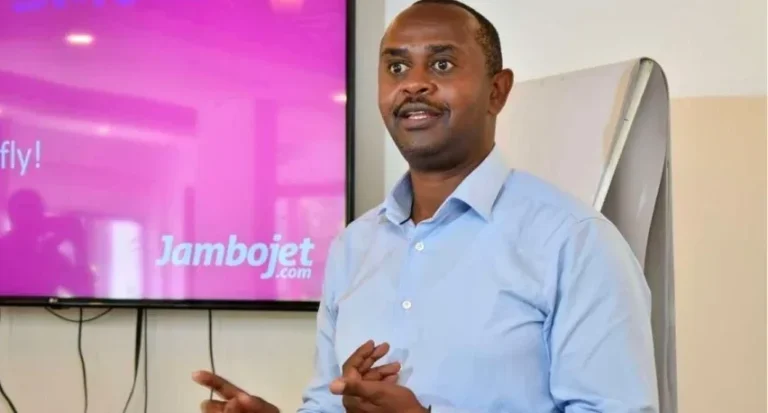Sometime last year, I met Karanja Ndegwa the Jambojet CEO at a food drive at the Our Lady of Nazareth Primary School in the Mukuru Kwa Njenga slums and sought to learn more about the Community Social Responsibility (CSR) projects that the airline is engaged in and this is what he had to say.
Tell us about yourself
My name is Karanja Ndegwa and I am the C.E.O and MD of Jambojet.
What can you tell us about the Jambojet CSR projects
At Jambojet, we are very passionate about giving back to the community, towards this we have two pillars under CSR, that is education and environment. Under environment, we have an ambition of getting to the net of carbon emissions. On a global scale, the year 2050 has been identified as the target to net carbon emissions to zero.
Which projects have you done under the environment pillar?
As I have said, as an airline Jambojet wants to reduce carbon emissions and the only way we can do that is by planting trees. We have set a target of planting 2 million trees and we are doing this by working with a partner in all the destinations that we fly so that after we plant the trees, they can look after them to maturity.
So far, the most successful project has been one that we did with Eldoret Water & Sewerage Company. We have also partnered with the Kenya Forestry Service to plant indigenous trees on Ngong Hills. In the Coast, we have embarked on a project to plant mangroves in Mombasa, Malindi, Lamu and Diani.
What can you tell us about the education pillar
As a company, we looked at the statistics and saw that a good number of pupils go to school without a meal and those who manage to finish Primary school are not able to proceed. As such, we decided to step in and make a change and that is how we started to invest in education for the underprivileged.
We started off by supporting four students per year but now we are supporting ten students each year. Initially we had set a cut off of 350 marks, but we lowered this in consideration of the difficult learning conditions that the pupils have to deal with.
Some of the schools that we support include our Lady of Nazareth Primary School in Mukuru Kwa Njenga, Kibos School for The Blind in Kisumu. In Diani, we work with a girls’ rehabilitation center which takes care of girls who have a problem with drug abuse and prostitution.
What led you to support Our Lady of Nazareth Primary School?
We started supporting the school in 2017, this is after the they approached us to fly the pupil who emerged as the best in K.C.P.E in that year to Mombasa as a gift. We obliged and have been working together since then, this school is also just four kilometers away from our headquarter so it makes sense to try make an impact in our neighborhood.
We started off with supporting two pupils through secondary school, the two did well in their examinations and have qualified to join University.
Under the education pillar, what does your support entail?
We usually pay for school fees for the students for the entire period that they are in high school. We don’t cater for things like shopping and transport because, we feel that it is good to have the parent involved in the journey. When it comes to university, we only step in incase the student is not able to get government sponsorship.
Other than secondary schools, which other institutions do you work with?
We work with the East African School of Aviation, this is in a bid to try and improve the workforce in the airline industry. This is because, we found that a number of students finish their courses, but they cannot be able to get attachments which means that getting a job becomes hard.
So, we work with the school to provide attachment to some of the students, who use it as a training ground. The internship takes about two years and by the end of it they are assured of getting a job in the industry. As a matter of fact, none of them have ever stayed more than a month without getting a job after finishing the internship. During the period of the internship, we usually pay a stipend to the interns to enable them to sustain themselves which is part of our CSR.
At times, the internship translates to employment, recently one of the interns that we had picked from the East African School of Aviation has become a Jambojet employee.
Have you embarked on CSR projects in your new destinations that is Lamu and Goma?
At the moment, we have not embarked on any CSR project in these locations but our people are looking at the needs in these destinations and we will soon identify one.

